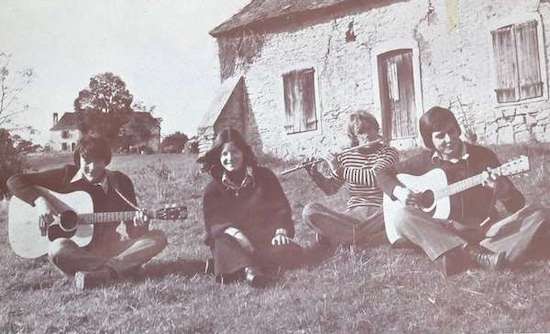How do we listen to music that tells stories, when we don’t speak the language? I have often grappled with this in recent years, feeling increasingly frustrated by language as a barrier to cultural understanding. A lack of linguistic capabilities has meant that for years much of the Japanese music I listened to was illegible to me – I had a mere inkling, for example, of just how bawdy Japanese folk singer Kan Mikami can be. More recently, this mystery has been amplified further, by a deep dive into the jangly (or should I say, jongleur) world of French and Occitan folk revival, much of it leaning medieval.
How to dive into a scene whose songbook escapes you? The diversity of languages is described as a divine punishment in the Bible story of the Tower of Babel, and it certainly feels it when scrying for meaning in narratively driven folksong. Without language, the words must become melodies, or we must interpret emotional context through tone or expression. It is highly likely, for example, that the Occitan songs of Los Deu Larvath will remain forever elusive to me. There are no two ways about it: I experience this music in mysterious ways: am partly engrossed in it because I do not understand the words, with any cheesiness or boorish lyrics escaping my ken.
I present this selection with the caveat that this is a fresh dig, with a number of dead ends at time of writing. I couldn’t find a full album in any digital format by Rene Daudan, for example, and heard too little to shell out for the import taxes. Also not included here, but which ought to be mentioned nonetheless, is a recent reissue of Breton harpist and folk singer Kristen Nogues‘ first album Marc’h Gouez on the label Souffle Continu, who also released hurdy-gurdy player Emmanuel Parrenin, both of whom would be included in any extended version of this list.
The go-to index for this scene appears to be an unobtainable book that might be French folk’s answer to Patrick Lundborg’s Acid Archives titled The French Folk Magic Time Guide, by someone who I’m sure is legally named Phileas Folk. It boasts a horrendous cover, with monstrous curly font and grotesque cartoons, and it is unobtainable at time of writing. While I continue to hunt for that, these five recommendations are a current deeply personal selection, that might be characterised as being more likely to be found in muddy animal-hide booties and drinking a farmy perry than twirling around a drum circle in floaty skirts propounding the benefits of herbal tea.
Los Deu Larvath – Coneguda Causa Sia (self-released)
The centrepiece of my deep dive is Coneguda Causa Sia by Occitan troupe Los Deu Larvath, about whom I can find out very little. The name means ‘the ten maggots’ in Occitan, but think freak-folk group Trees and you’re getting warmer. It’s pastoral but not flouncy and the choral motifs in the opening track are seriously earwormy. I did a double take on the cover, which at a glance looks like the Motorpsycho poster, or a Finders Keepers Giallo soundtrack reissue, but is actually the original 70s artwork. Those involved don’t seem to be connected to many other groups at all, and when I contacted Dizonord Marseille (who reissued the essential Re…



